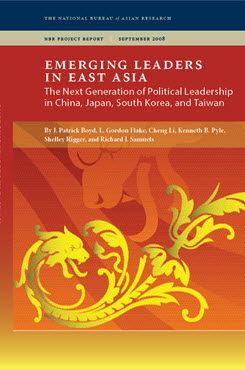From Emerging Leaders in East Asia: The Next Generation of Political Leadership in China, Japan, South Korea, and Taiwan
The Rise, Fall, and Transformation of the "386"
Generational Change in Korea
The pace of development and societal transformation in Korea over the past half century has been truly dramatic. The extent of this change has endowed several generations in the post–Korean War era with remarkably distinct characteristics, despite the relatively short time span. This article focuses primarily upon the cohort, at times celebrated and at times reviled, popularly known as the “386 generation” and the pivotal generation for understanding Korea’s present and future trajectory into the next ten to fifteen years. While this generation’s rise and fall in the past decade has been meteoric, it is its ongoing transformation that most bears observation.
EXECUTIVE SUMMARY
The pace of development and societal transformation in Korea over the past half century has been truly dramatic. The extent of this change has endowed several generations in the post–Korean War era with remarkably distinct characteristics, despite the relatively short time span. This article focuses primarily upon the cohort, at times celebrated and at times reviled, popularly known as the “386 generation” and the pivotal generation for understanding Korea’s present and future trajectory into the next ten to fifteen years. While this generation’s rise and fall in the past decade has been meteoric, it is its ongoing transformation that most bears observation.
MAIN FINDINGS
Within the lifespan of a single generation, Korea has experienced tremendous social change. However, the various stages of this transformation have impacted subsequent generations during their most formative times in starkly different ways. The 386 generation’s views and values were forged during the key period of Korea’s transition to democracy in the 1980s. While the political activities of the core student activists from that time have garnered the most attention, perhaps the most transformative influence of the 386 generation has been in the cultural, civic, and business sectors. During the past five years this generation shared the Roh Mu Hyun administration’s rise to prominence as well as its cataclysmic decline. Today, the 386 generation is among Korea’s largest and remains, despite recent setbacks, extremely influential in Korea’s political sphere. While individual interests, tactics, and direct involvement of this particular generation are changing, its core values remain distinctive and will continue to set expectations for both domestic and foreign policy.
POLICY IMPLICATIONS
- Observers in the U.S. would be mistaken to conclude definitively that the recent election of the relatively conservative Lee Myung Bak and the subsequent success of the Grand National Party in the National Assembly elections mark a return to the harshly anti-Communist and unquestioningly pro-alliance positions of previous decades.
- Future Korean administrations, as well as Korea’s international relations, will continue to be influenced by and in some respects held to the standards advanced by Korea’s rising generations.


